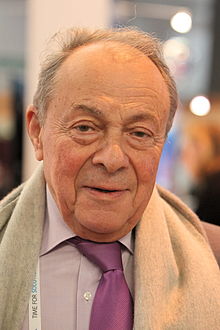Michel Rocard
| Michel Rocard | |
|---|---|

Rocard in 2012
|
|
| 108th Prime Minister of France | |
|
In office 10 May 1988 – 15 May 1991 |
|
| President | François Mitterrand |
| Preceded by | Jacques Chirac |
| Succeeded by | Édith Cresson |
| First Secretary of the Socialist Party | |
|
In office 1993–1994 |
|
| Preceded by | Laurent Fabius |
| Succeeded by | Henri Emmanuelli |
| Minister of Agriculture | |
|
In office 22 March 1983 – 4 April 1985 |
|
| President | François Mitterrand |
| Prime Minister |
Pierre Mauroy Laurent Fabius |
| Preceded by | Édith Cresson |
| Succeeded by | Henri Nallet |
| Minister of Territorial Development | |
|
In office 22 May 1981 – 22 March 1983 |
|
| President | François Mitterrand |
| Prime Minister | Pierre Mauroy |
| Preceded by | Fernand Icart |
| Succeeded by | Gaston Defferre |
| Personal details | |
| Born |
23 August 1930 Courbevoie, Hauts-de-Seine |
| Died | 2 July 2016 (aged 85) Paris, France |
| Political party | Socialist |
| Alma mater | Sciences Po, ÉNA |
| Occupation | Civil Servant |
| Religion | Protestant (French Reformed) |
Michel Rocard AC (French: [miʃɛl ʁɔkaʁ]; 23 August 1930 – 2 July 2016) was a French politician and a member of the Socialist Party (PS). He served as Prime Minister under François Mitterrand from 1988 to 1991, during which he created the Revenu minimum d'insertion (RMI), a social minimum welfare program for indigents, and achieved the Matignon Accords regarding the status of New Caledonia. He was a member of the European Parliament, and was strongly involved in European policies until 2009. In 2007, he joined a Commission under the authority of Sarkozy's Minister of Education, Xavier Darcos.
Rocard was born in Courbevoie, Hauts-de-Seine, to a Protestant family, son of the nuclear physicist Yves Rocard. He entered politics as a student leader whilst studying at Sciences-Po. He became chair of the French Socialist Students affiliated to the main French Socialist party at the time, the French Section of the Workers' International (SFIO), and studied at the École nationale d'administration (ENA), after which he chose to enter the prestigious Inspection des finances. As an anti-colonialist, he went to Algeria and wrote a report regarding the widely ignored refugee camps of the Algerian War (1954–62). This report was leaked to the newspapers Le Monde and France Observateur in April 1959, almost costing Rocard his job.
...
Wikipedia
